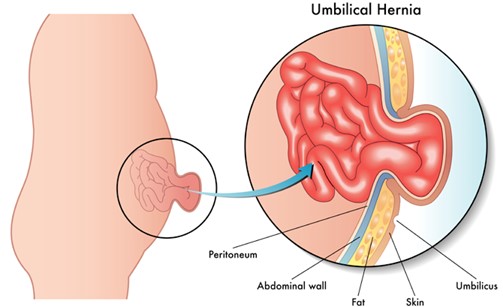A mother brings her 4-month-old son to the clinic with a quarter taped over his umbilicus, and tells the nurse the quarter is supposed to fix her child's hernia. Which explanation should the nurse provide?
An abdominal binder can be worn daily to reduce the protrusion.
This hernia is a normal variation that resolves without treatment.
The quarter should be secured with an elastic bandage wrap.
Restrictive clothing will be adequate to help the hernia go away.
The Correct Answer is B
Choice A: An abdominal binder can be worn daily to reduce the protrusion is not a correct explanation for the nurse to provide, as this is not an effective or recommended method to treat a hernia. This is a distractor choice.
Choice B: This hernia is a normal variation that resolves without treatment is a correct explanation for the nurse to provide, as this refers to an umbilical hernia, which is a common and harmless condition in infants that usually disappears by age 2. Therefore, this is the correct choice.
Choice C: The quarter should be secured with an elastic bandage wrap is not a correct explanation for the nurse to provide, as this is a folk remedy that has no scientific basis and can cause skin irritation and infection. This is another distractor choice.
Choice D: Restrictive clothing will be adequate to help the hernia go away is not a correct explanation for the nurse to provide, as this is not a proven or safe way to treat a hernia. This is another distractor choice.

Nursing Test Bank
Naxlex Comprehensive Predictor Exams
Related Questions
Correct Answer is C
Explanation
Choice A reason: Notifying the healthcare provider is an important action, but not the first one. The nurse should prioritize interventions that address the client's immediate needs, such as oxygenation and circulation.
Choice B reason: Preparing a continuous heparin infusion per protocol is an appropriate action for preventing further clot formation and reducing the risk of recurrent pulmonary embolism, but it is not the first action. The nurse should first stabilize the client's condition before administering anticoagulant therapy.
Choice D reason: Bringing the emergency crash cart to the bedside is a prudent action, but not the first one. The nurse should prepare for possible cardiopulmonary resuscitation (CPR) in case of cardiac arrest, but should first attempt to prevent it by providing oxygen and other supportive measures.
Correct Answer is C
Explanation
Choice A: An adult client with a tracheal tube draining clear, pale red liquid drainage. This client should not be assessed last, as they may have a potential airway obstruction or infection. The tracheal tube drainage should be monitored for color, amount, and consistency, and suctioned as needed.
Choice B: An older client with dark red drainage on a postoperative dressing, but no drainage in the Hemovac. This client should not be assessed last, as they may have a potential hemorrhage or wound dehiscence. The postoperative dressing and Hemovac should be monitored for color, amount, and odor, and changed as needed.
Choice C: An adult client with no postoperative drainage in the Jackson-Pratt drain with the bulb compressed. This client can be assessed last, as they have no signs of complications or problems. The Jackson-Pratt drain is a closed suction device that collects fluid from a surgical site. The bulb should be compressed to create negative pressure and facilitate drainage.
Choice D: An older client with a distended abdomen and no drainage from the nasogastric tube. This client should not be assessed last, as they may have a potential bowel obstruction or perforation. The nasogastric tube is inserted through the nose into the stomach to decompress gas and fluid. The abdomen should be monitored for size, shape, and bowel sounds, and the nasogastric tube should be checked for patency and placement.
Whether you are a student looking to ace your exams or a practicing nurse seeking to enhance your expertise , our nursing education contents will empower you with the confidence and competence to make a difference in the lives of patients and become a respected leader in the healthcare field.
Visit Naxlex, invest in your future and unlock endless possibilities with our unparalleled nursing education contents today
Report Wrong Answer on the Current Question
Do you disagree with the answer? If yes, what is your expected answer? Explain.
Kindly be descriptive with the issue you are facing.
